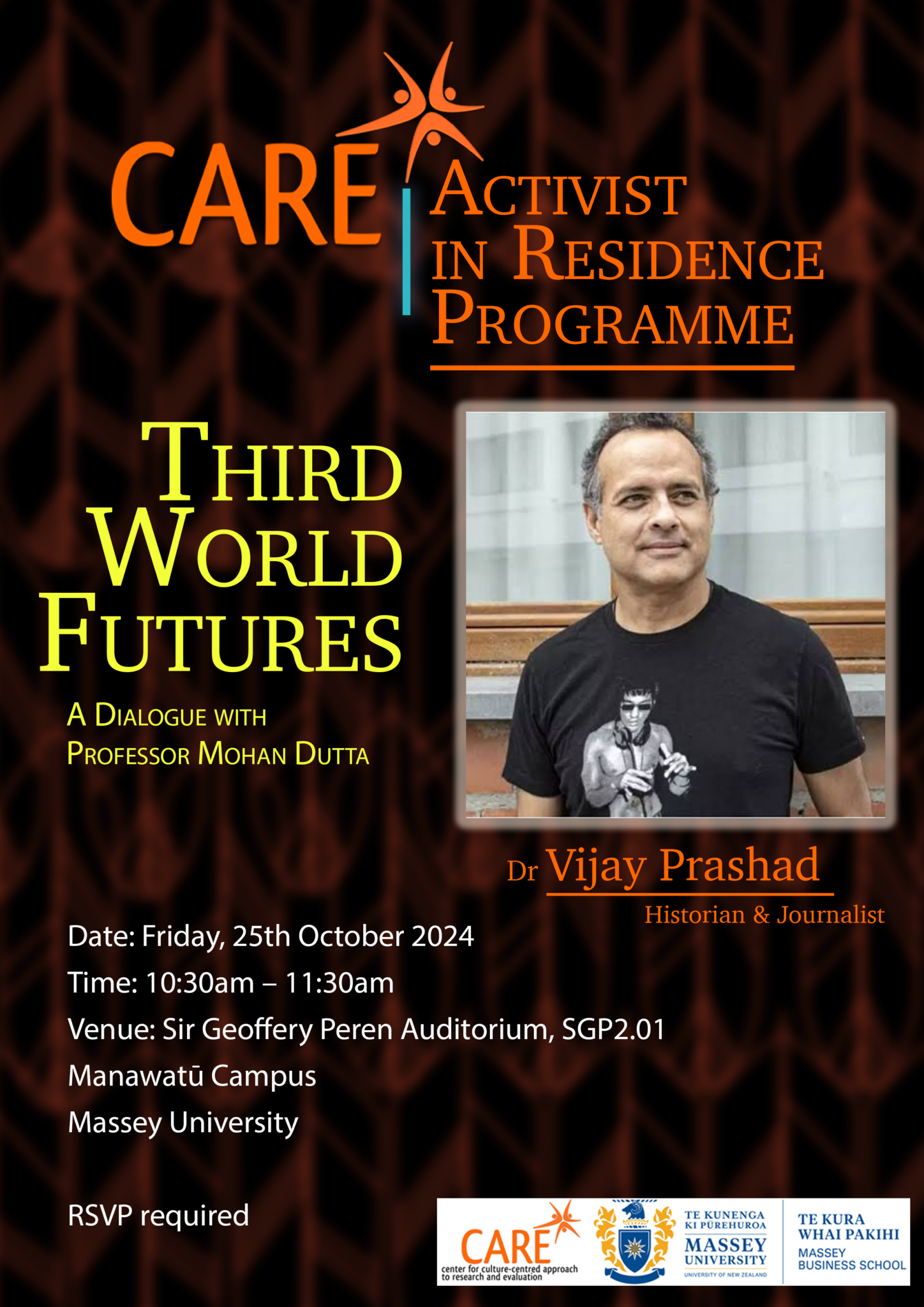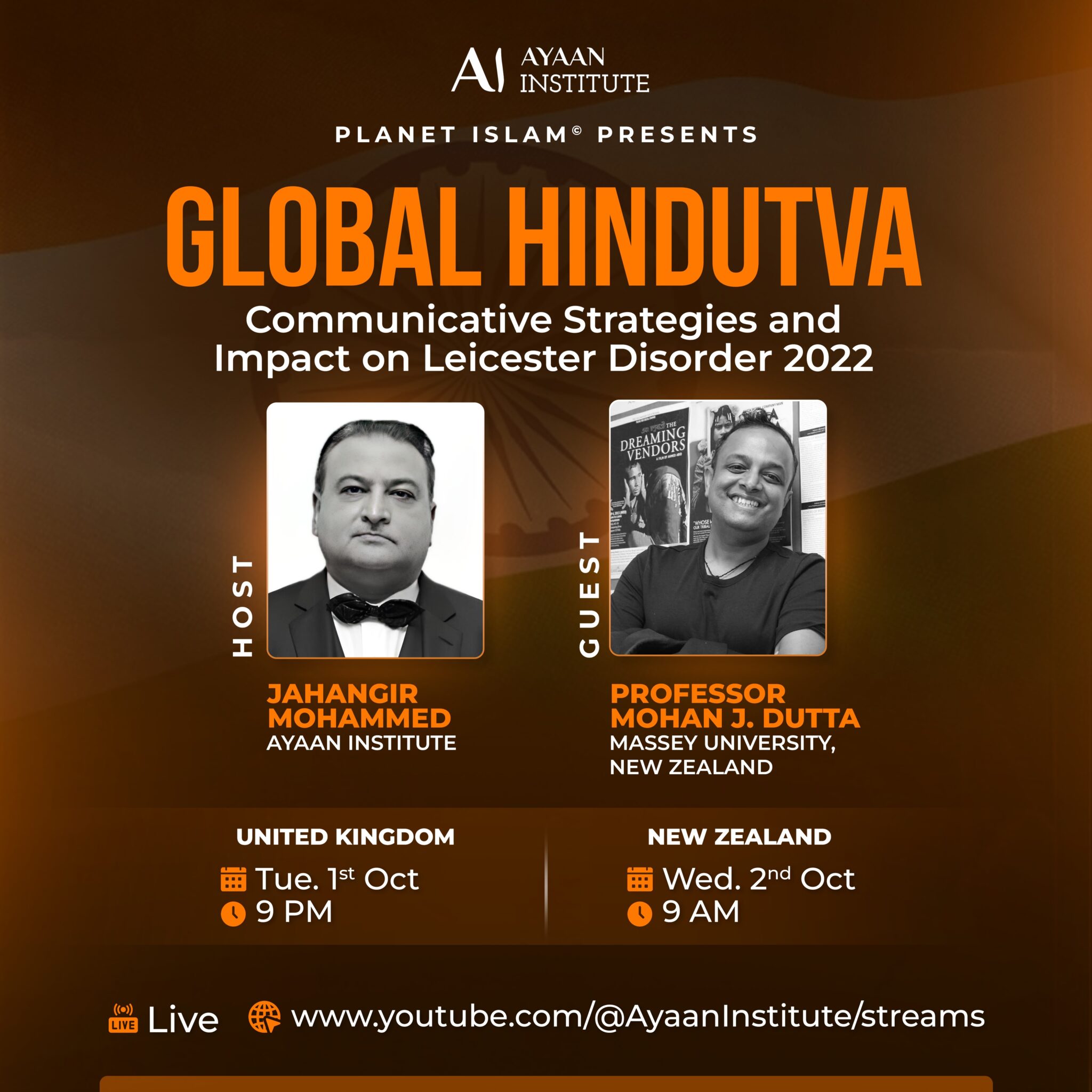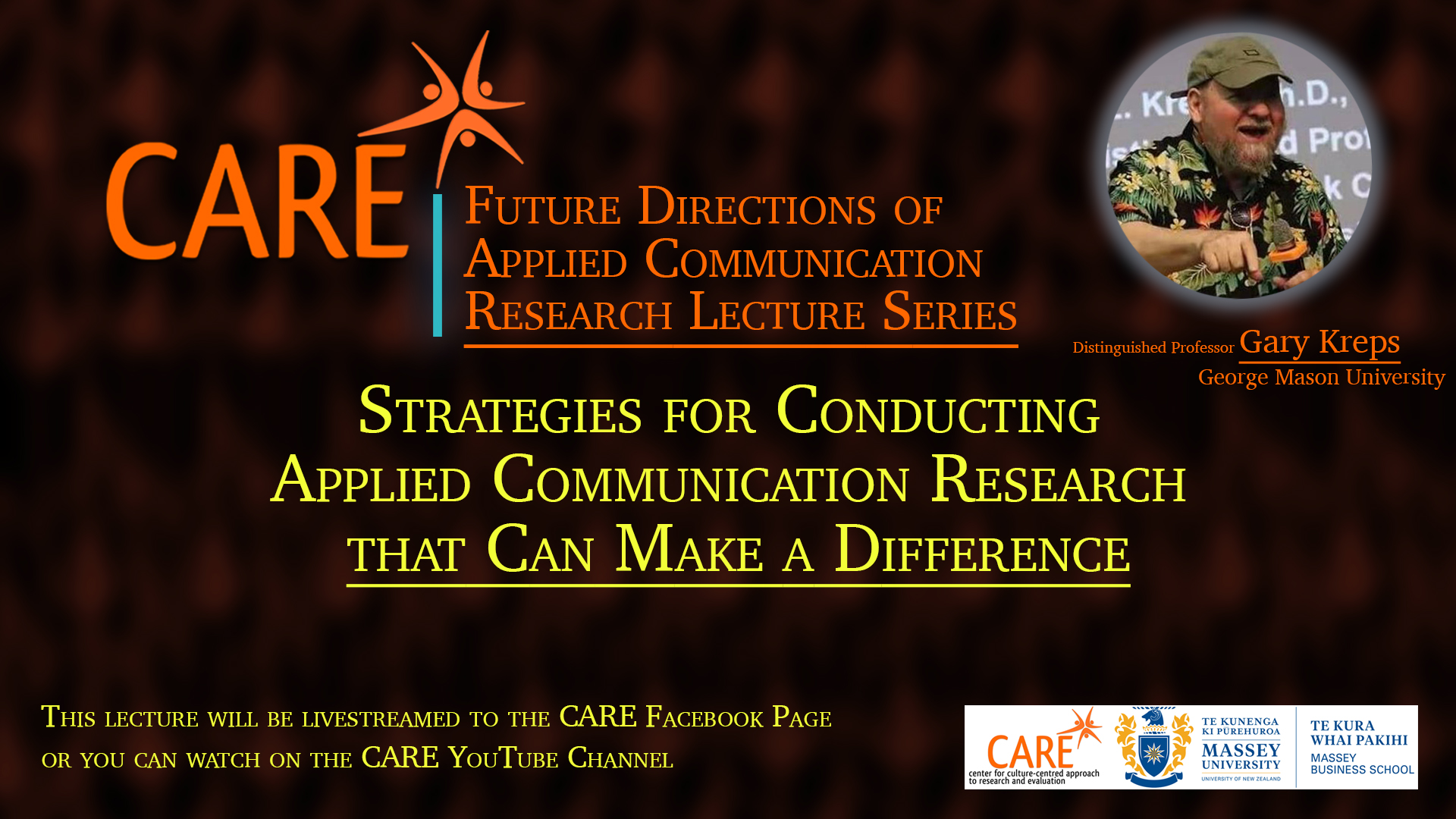2025 Oceania Hub ICA Conference 13-16 June 2025
Check out the 2025 Oceania Hub ICA Conference Programme
Massey to host Oceania hub of the International Communication Association conference
Democratic Future Series – Lecture 1
“Culturally Centering Democracy”
Thursday 17 April 2025 8pm NZST, Professor Mohan Dutta
Coming soon CARE’s Democratic Future Series – Lecture 1 hosted by Professor Mohan Dutta “Culturally Centering Democracy” this Thursday 17 April 2025 8pm NZST. Live streamed on Facebook or alternatively you will be able to view it on CARE’s YouTube channel.
https://www.facebook.com/CAREMassey
https://www.youtube.com/@caremassey
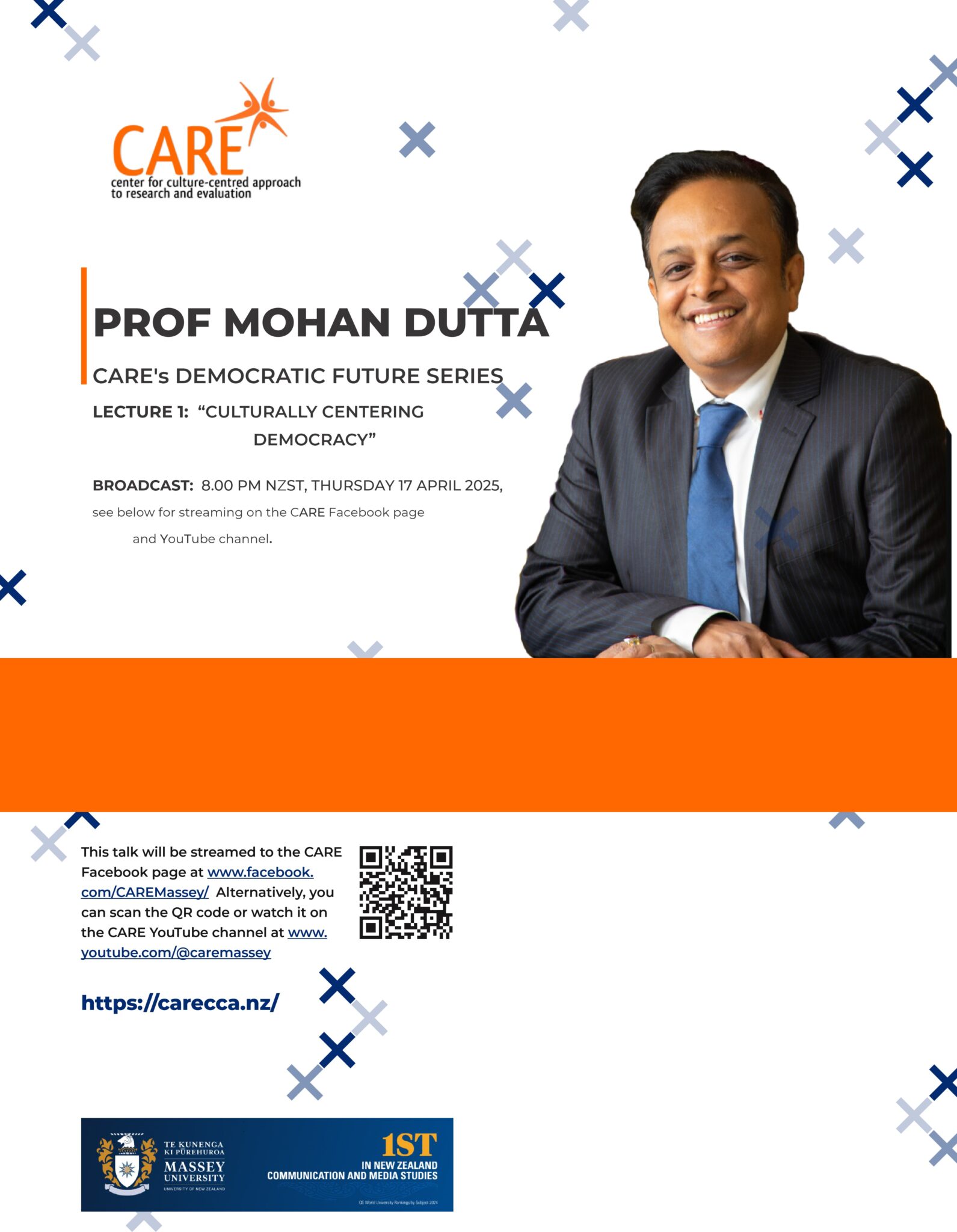
The Free Speech Union’s targeting of Universities: Why we must resist the distortions
Monday 17 March 2025, By Professor Mohan Dutta

Universities have increasingly found themselves as targets of Far-Right campaigns seeking to destabilize them. In Aotearoa as in connected settler colonial spaces, this Far-Right campaign is the face of white supremacy, seeking to platform extremists, and concocting a discourse of panic around the Western University in danger because of the struggles put forth by Indigenous, Black, ethnic migrant and diverse intersectional communities against the prevailing ideology of white supremacy.



At the core of the moral panic propagated by the Far-Right is the construction of the University as a hallowed institution of Western civilization (as if Universities and knowledge generating spaces didn’t exist outside of the West). Projecting Indigenous, Black, and migrant communities as threats to Western values, the racist campaign of the Far Right seeks to return the modern University to its good old days. Consider the following post by McGimpsey, a Case, Research and Drafting Advisor at the FSU until March, 2024.

These good old days reflect the times before critical race theory; diversity, equity and inclusion (DEI); and decolonization. In Aotearoa, these good old days are concocted fabrications of a past pre Te Tiriti.

These good old days are days of yore before the colored multitude took over the Universities and turned them into woke bastions!
Positioning itself as the advocate of free speech in Aotearoa and uncritically deployed by the media as a credible source on free speech issues (in spite of multiple analyses that have debunked the methods deployed by the FSU), the Free Speech Union draws on this narrative of decolonization and DEI as threats to the Western ideals of academic freedom.

It glorifies a false narrative of the Anglosphere as the strongest anchor for peace and prosperity, actively erasing the empirically documented history of colonial violence. Consider the following post from the FSU’s X handle, which the handle later apologized for after being publicly called out for the racism.
The FSU is very much a part of the broader global infrastructure of propaganda seeking to impose a narrow definition of free speech and academic freedom on Universities, strategically conflating the two, driven by the agenda of upholding and reproducing the hegemonic status quo.
This broader context offers explanatory ground for understanding the systemic attack launched by FSU on Massey University. The University and its progressive vision that aspires to build a future shaped by Te Tiriti offers a decolonising register that fundamentally threatens the ideology of white supremacy. An earlier decision by the University to not host an event with Don Brash because of the leadership’s worry around being seen as endorsing racism placed it as a target of the FSU.
It is no surprise then that the PULSE survey on organizational climate at Massey University secured through an OIA request becomes the lightning rod for FSU to amplify its campaign targeting the University. The FSU framing of the survey is constructed around ideas of academic freedom. An FSU letter and an RNZ story quoting the FSU state, “Universities rely on voices being free. How do academics progress knowledge in an environment that doesn’t welcome debate and dissenting ideas?”
The FSU hyperbole would lead the reader to believe academic freedom is under threat at Massey. Yet, critical interrogation of the claim lays visible its vacuous form. The hyperbole from FSU is in response to a qualitative comment on the section on Two-way communication, which stated, “Staff also fear that they are not safe to express their honest opinions for fear of reprisal of being seen as not towing the party line.” That cherry picked sentence (We know from my past analyses that the FSU has a penchant for cherry picking responses to fit its ideological agenda) is part of a broader excerpt in a section on staff responses to the prompt, “At Massey University there is open and honest two-way communication.” The prompt had nothing to do with progressing knowledge within one’s own expertise area and the freedom to do so.
The broader paragraph that showcased the example read:
“Staff feel there is a lack of open and honest two-way communication at Massey University. They perceive that senior leadership is not transparent and that important decisions are made without sufficient consultation or input from staff and students. Staff also feel that they are not safe to express their honest opinions for fear of reprisal or being seen as not towing the party line.” The paragraph in its entirety seems to be speaking to the decision-making and consultation processes in the management and administration of the University. It is clear that the staff perceptions of two-way communication are around the University’s day-to-day management functions, not around academic freedom in topic areas of expertise.
The same section also has positive and neutral examples of staff response. The positive response for instance states:
“Staff feel confident that their PVC and HoS are receptive to feedback and make changes when needed. Staff also appreciate the collegial and friendly atmosphere at Massey and feel fortunate to have supportive supervisors who they can communicate with freely. The official and legally correct communication style of the university is also seen as a positive.”
The neutral response states, “There is open and honest two-way communication among staff within schools and between colleagues. However, there is a lack of transparency in leadership decision-making and communication from senior leadership to staff. Some staff feel that their concerns are not listened to and that there is a level of distrust among staff about messages coming from senior leadership.”
Again, both of these responses are reflective of what the overarching prompt was about, perceptions about two-way communication in the organizational practices of the University. Unlike what the FSU makes the responses to look like, the qualitative comments across the spectrum reflect the objective of the prompt, to gauge staff perceptions about two-way communication in the management of the University.
When one picks qualitative comments for analyses, there are going to be a wide range of responses that capture diverse opinions. Considering the sentiment analysis of the generated narratives in response to the prompt, it is worth noting that 5% of staff offer positive responses, 29% offer neutral responses, and 66% offer negative responses. What this does point to is the opportunity to grow two-way communication across the layers of decision-making in the University. The sharing of the PULSE survey report itself, including the range of responses is an exemplar of transparency, a critical step toward building two-way communication. Moreover, the survey itself is part of a process that can work toward building and growing organizational culture.
One might ask, how would I personally respond to the item? I have access to this survey and to diverse platforms to communicate my views on this issue of organizational communication and will certainly not be turning to the FSU to communicate my perception.
What the prompt and the responses to it however don’t capture is academic freedom. There is no evidence to support FSU’s mischievous framing “How do academics progress knowledge in an environment that doesn’t welcome debate and dissenting ideas?” The prompt that generated the responses had nothing to do with academic freedom. Broadly, the PULSE survey actually is not designed to evaluate the space for dissenting (academic) ideas. It is not an academic freedom survey. In fact, when you look at the entirety of the PULSE survey, you recognize that the survey is not designed to evaluate the climate of the University around academic freedom, the freedom to teach and research ideas in one’s area of expertise. That would be an important survey to have on hand, but this isn’t it.
Why then does the FSU construct this slippage between organizational climate and academic freedom? It is my sense that this slippage from staff response to questions of organizational communication and processes to academic freedom is part of a broader ideological agenda of the FSU around creating a moral panic around academic freedom, decolonization and Te Tiriti.
As I have noted in the past, when it comes to academic freedom, when my academic freedom has been targeted, initially by Hindutva extremists, the FSU was absent. Not only did it not have any public statements to make around the organized campaign targeting my academic freedom, it also went ahead to platform one of the Hindutva propagandists who also appeared on Counterspin, and had organized a campaign targeting my job at the University. I will also note here that when I had publicly noted this strategic absence of the FSU, one of its propagandists had suggested I was lying although they couldn’t offer any evidence of FSU offering support for my academic freedom.
More recently, in the context of my critiques of Zionist settler colonialism and the ongoing genocide being perpetrated by Israel in Gaza, far-right Zionist infrastructures in Aotearoa have targeted my academic freedom based on planted misinformation. This campaign is part of a broader campaign in Aotearoa launched by Far-Right Zionists targeting academic voices critical of Israel. Two of these Zionist creators and disseminators of disinformation sit on or have sat on the Board of the FSU (The exhibit below shows one of the posts by David Cumin, based on misinformation about the claim I made and that I have deleted a blog post, which I never did. See here). One of these Zionist propagandists targeted my job at Massey University, tagging the University and sought to get me fired.


In the face of public criticism that noted the hypocrisy of the FSU, the propagandist then peddled the same misinformation in an email sent out from the FSU email address to the FSU listserv. This resulted in increased hate and trolling that I received, including hate messages left on my official email and phone threatening to send me back to ‘wherever I came from.” Now these are actual examples of threats to academic freedom, and they originate from within the infrastructures of the FSU.
I will wrap up by making a critical observation, that in the face of the threats to my academic freedom, including in instances of foreign interference, my employer, Massey University Te Kunenga ki Purehuroha, has stood firm and stood tall by me. This public support by the University and its senior leaders has meant that the University has become a source of further aggravated attacks from the Far-Right on its institutional structure and processes. It has offered the necessary critical support, the support with security, and the support with care, including Senior Leadership calling up on me to check how I am doing. In the face of the threats to my academic freedom that came directly from the networks of the FSU, the fear that this campaign induced in me around my safety and public scholarship, my employer has stood by me. I would any day take the commitments and negotiations of the University I work in around questions of academic freedom seriously than I would an astroturf organization seeking to insert a wedge around academic freedom to serve its ideological agenda of dismantling the critical decolonization work much needed in our Universities in Aotearoa and globally.
The work of decolonization must go on.
CARE Activist in Residence Programme Dr. Vijay Prashad | 25 October 2024
Center for Culture-Centered Approach to Research & Evaluation (CARE), Massey University is excited to announce the Activist in Residence Programme featuring a world-renowned historian and journalist Dr. Vijay Prashad.
This highly anticipated CARE event called Third World Futures – A Dialogue with Vijay Prashad and Professor Mohan Dutta will take place on 25th October 2024 at the Sir Geoffrey Peren Auditorium (SGP2.01) on the Manawatū Campus, Massey University at 10.30 am NZDT.
About Dr. Vijay Prashad
Dr. Vijay Prashad is a distinguished Indian historian, journalist, and author, widely recognized for his influential work on global history and politics. He has authored forty books, including prominent titles such as Washington Bullets, Red Star Over the Third World, The Darker Nations: A People’s History of the Third World, and The Withdrawal: Iraq, Libya, Afghanistan, and the Fragility of U.S. Power, co-written with Noam Chomsky.
In addition to his literary contributions, Dr. Prashad serves as the executive director of Tricontinental: Institute for Social Research, the chief correspondent for Globetrotter, and the chief editor of LeftWord Books in New Delhi. He has also appeared in the films Shadow World (2016) and Two Meetings (2017), which further amplify his critique of global power dynamics.
The CARE Activist in Residence Programme offers a unique opportunity to engage with Dr. Prashad’s extensive research and activism, spanning topics from the history of the Global South to the fragility of U.S. power in the 21st century. Attendees will gain insights into current global political challenges and the transformative role of activism and scholarship.
This event is free to attend and open to all. We look forward to welcoming you to what promises to be an enlightening and inspiring discussion.
Watch the full event recorded on the CARE YouTube and CARE Facebook channels:
YouTube: https://www.youtube.com/watch?v=1sLGQtHdFF8
Facebook: https://www.facebook.com/events/1399316128140020
Facebook events page: https://www.facebook.com/events/1237882210738575
RSVP here: https://forms.office.com/r/GVXSdq2Sh1
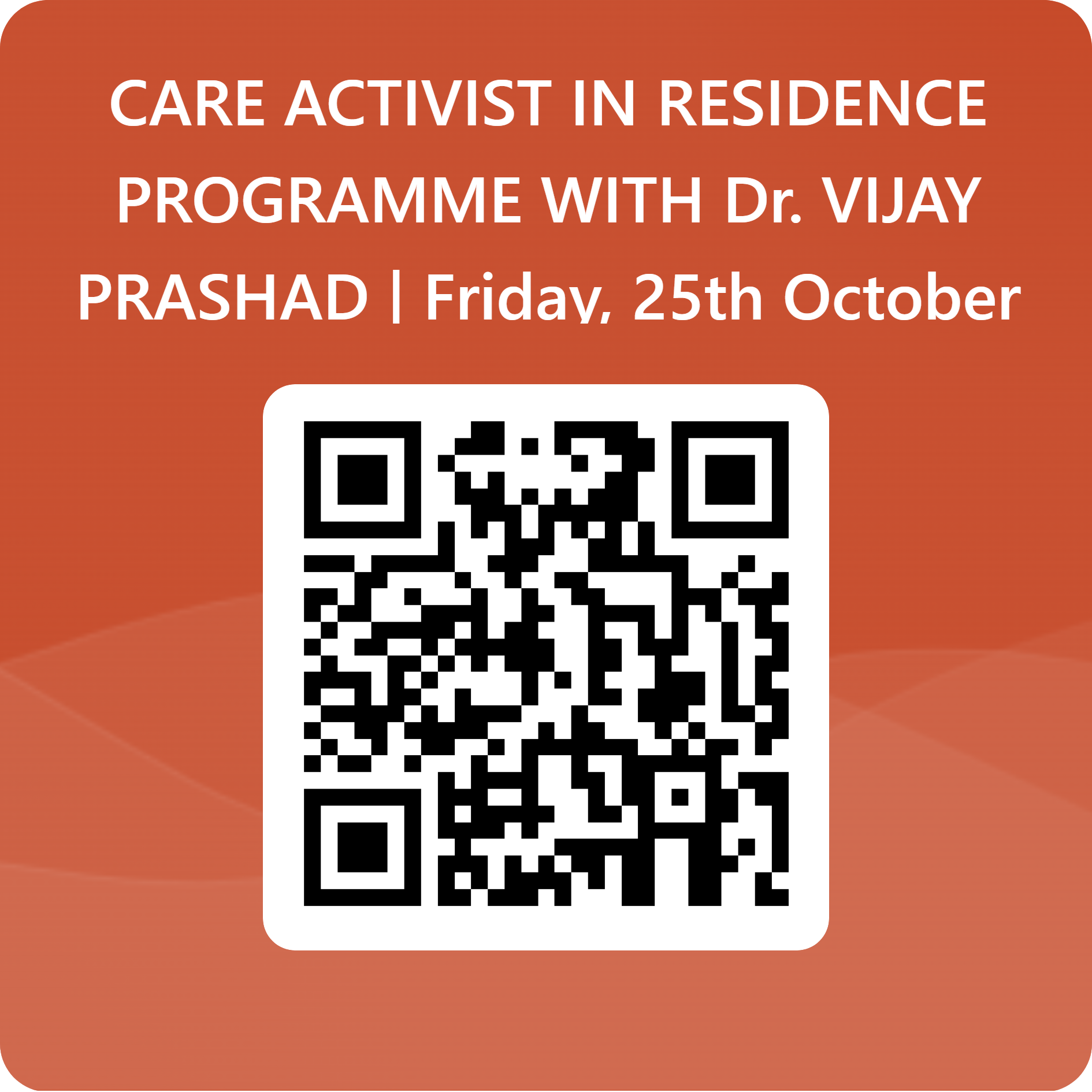
Event Details:
– Date: Friday, 25th October 2024
– Time: 10:30 AM – 11:30 AM NZDT
– Venue: Sir Geoffrey Peren Auditorium (SGP2.01), Manawatū Campus, Massey University (Google Maps: https://maps.app.goo.gl/uiPcVek6LbFRCxB2A)
Read more: https://www.massey.ac.nz/about/news/care-to-host-renowned-intellectual-for-activist-in-residence-programme/
#CAREConversations#MasseyUniversity #CAREMassey #Aotearoa #NewZealand #ThirdWorldFutures #GlobalSouthVoices#Anticolonialism #SustainableFutures #MasseyEvents #CAREActivistInResidence #TransformingTheSouth
Professor Mohan J Dutta features on Ayaan Institute’s podcast on Global Hindutva: Communicative Strategies and Impact on Leicester Disorder 2022
CARE: Center for Culture-Centered Approach to Research and Evaluation is excited to share the podcast by Prof. Mohan Dutta, Massey University with Mr Jahangir Mohammed, Ayaan Institute on #GlobalHindutva
The latest Ayaan Institute podcast episode features an insightful discussion with Professor Mohan J Dutta from Massey University. Dive into his groundbreaking research on Global Hindutva and its impact on the #Leicester disorder in September 2022. This episode also explores the connections between #Hindutva, far-right narratives, and violence.
This podcast was streamed LIVE and recorded on 2nd October.
Don’t miss out! Watch now: https://www.youtube.com/live/5TPK7dDs_Lk
Read more about Ayaan Institute here: http://www.ayaaninstitute.com/
Opinion: The Free Speech Union: Leaping from climate surveys to moral panic
Wednesday 18 September 2024 by Professor Mohan Dutta
The trope of academic freedom in danger is a critical resource in the organised attack of the far-right on the modern university. One of the core techniques of the far-right in its efforts to destabilise academic institutions, is cook up a frenzy around free speech – intentionally conflating free speech issues with academic freedom. As an exemplar of the communicative inversions performed by the far-right, the panic around academic freedom is actually a critical tool in catalysing attacks on the academic freedom of decolonising practices in the university environment. What the far-right, and the underlying infrastructure of white supremacy is triggered by, is that universities are slowly transforming, starting to acknowledge that centuries of colonial epistemic violence have erased the knowledge infrastructures of colonised peoples.
In Aotearoa New Zealand, as I have demonstrated in my analyses, the Free Speech Union uses ideologically motivated faulty surveys to create panic around academic freedom. With a fundamentally incorrect understanding of academic freedom (the freedom of academics to teach and publish in their areas of expertise) that conflates it with free speech, the Union constructs its propaganda around specific ideological issues (Te Tiriti o Waitangi, gender justice, and so on) which are at the heart of the far- right’s culture war propaganda in Aotearoa.
In its most recent campaign, the Free Speech Union has turned to releasing leaked climate surveys to construct the argument that academic freedom is under threat in Aotearoa. Deploying the tactical tool of leaks, it builds an affective register around academic climates, suggesting these environments are threatening academic freedom.
In August, the Free Speech Union targeted the Law School at Auckland University of Technology (AUT), placing its propaganda around a leaked climate survey (to David Farrar, yes, the same David Farrar that runs the debunked Free Speech Union survey on academic freedom) that suggested faculty dissatisfaction. Commenting on the selective excerpts from the survey published on David Farrar’s blog, noted Jonathan Ayling, the Chief Executive of the Union:
“Academics are being criticised and punished for speaking out, causing them and others to resort to self-censorship. Again, results from an internal law school survey displayed very low levels of satisfaction. This included 30% claiming they feel uncomfortable reporting inappropriate behaviour and more than one-in-three respondents experiencing bullying in the past six months.”
Mr Ayling’s blog then reports on a letter sent out to the Minister of Education and the AUT Vice-Chancellor. When you look closely at the items shared on Mr Farrar’s blog however, there is not a single reported item on the blog that substantiates the claim “academics are being criticised and punished for speaking out.” You also won’t find an item that actually measures self-censorship.
In other words, the frame around threat to academic freedom that is part of the moral panic crafted by the Free Speech Union in its press release and the letter to the Minister of Education is not substantiated empirically. There is no evidence of academics being punished for speaking out, as Mr Ayling claims.
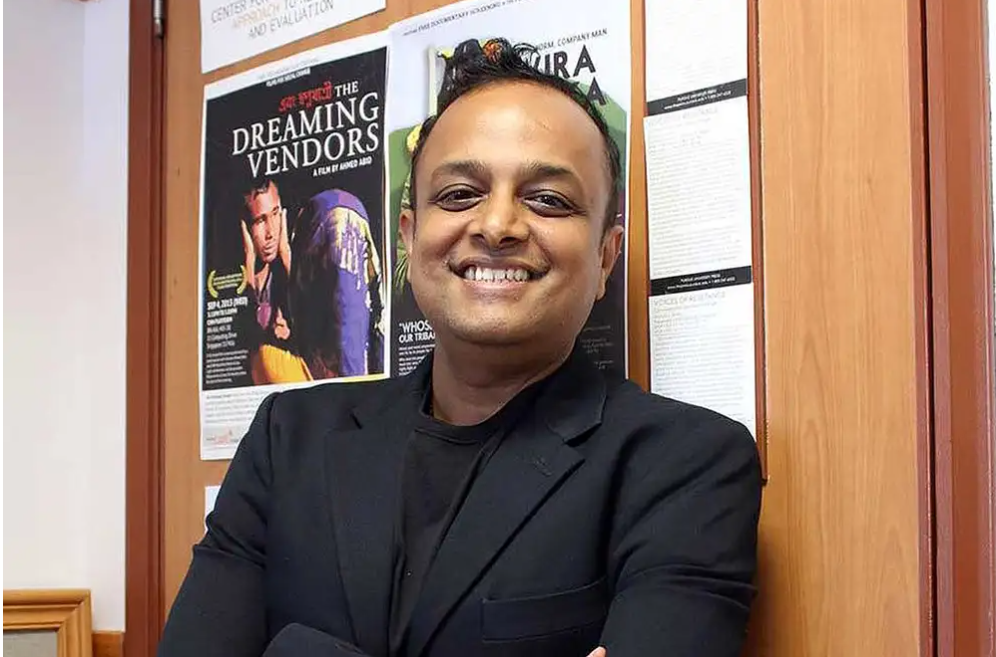
Mr Farrar’s blog embellishes the ideological reading of the survey with leaked emails and speculations. The survey creates the opening for attacking the Dean of Law at AUT who had spoken out against the attack on the teaching of Tikanga Māori. Writes Mr Farrar: “Now readers will recall that the Dean of Law is Khylee Quince and she attracted a lot of publicity when she called a senior KC a racist dinosaur who should go off and die in the corner.” The blog wraps up by further constructing the Dean as threat to academic freedom:
“As you can see the results for the Law Faculty are much much lower than AUT as a whole. So this would suggest the major issue is not the central administration, but the faculty management itself. I am told by sources that everyone knows what the major problem is, but people are too scared to say so.”
Note here the slippage from the report of a leaked climate survey to hearsay – the architecture of gossip in: “everyone knows what the major problem is, but people are too scared to say so.”
It is worth noting the targeting of the AUT Dean of Law, Māori academic Khylee Quince, is part of a broader campaign targeting senior Māori academics (often women) who have spoken out publicly against the white supremacist structures that make up universities in settler colonial Aotearoa New Zealand, and their organised campaigns directed at erasing the decolonising registers that have been built through decades of struggle. The ideologically motivated campaign around academic freedom mobilised by Mr Farrar and Free Speech Union works on slippages to construct the narrative of academic freedom under threat. Implicit in this, is the positioning of Te Tiriti o Waitangi as a threat to academic freedom in Aotearoa.
Indeed, the academic climate of settler colonial universities, embedded in whiteness and mobilised to uphold white supremacy, has worked historically to erase decolonising registers of knowledge generation. Prevailing norms of whiteness have devalued and undermined Indigenous knowledge claims, often working aggressively to silence decolonising scholarship. The voices of Indigenous and postcolonial academics have historically been silenced, with the academic freedom to do decolonising scholarship severely constrained by the norms of whiteness, upheld by notions of civility and norms of communication within white academic structures.
As universities in Aotearoa New Zealand, as with universities across settler colonial spaces globally, have started their decolonising journeys around reconciliation and recognition of Indigenous rights, the far-right white supremacist campaign seeking to silence these efforts has worked incessantly to construct decolonisation as a threat to academic freedom. The implicit and explicit targeting of Te Tiriti o Waitangi and the positioning of Te Tiriti in opposition to academic freedom must be read within the broader architecture of the global proliferation of white supremacist backlash against decolonisation. Any conversation on academic freedom must begin with the recognition that the far-right panic around academic freedom is a threat to the academic freedom of academics studying, teaching, researching and publicly engaging on decolonisation, postcolonial theory, critical race theory etc. It must also be noted that academics teaching and researching in these areas have historically faced diverse intersecting forms of marginalisation, harassment, and threats to their academic freedom.
Professor Mohan Dutta is Dean’s Chair Professor of Communication. He is the Director of the Center for Culture-Centered Approach to Research and Evaluation (CARE), developing culturally-centered, community-based projects of social change, advocacy, and activism that articulate health as a human right. He is a member of the board of the International Communication Association.
Article Source: Massey News
CARE | Future Directions Of Applied Communication Research Lecture Series | Leveraging Network Science to Address Grand Societal Challenges
The Second Lecture:
Leveraging Network Science to Address Grand Societal Challenges with Professor Noshir Contractor, Jane S. & William J. White Professor of Behavioural Sciences, Northwestern University.
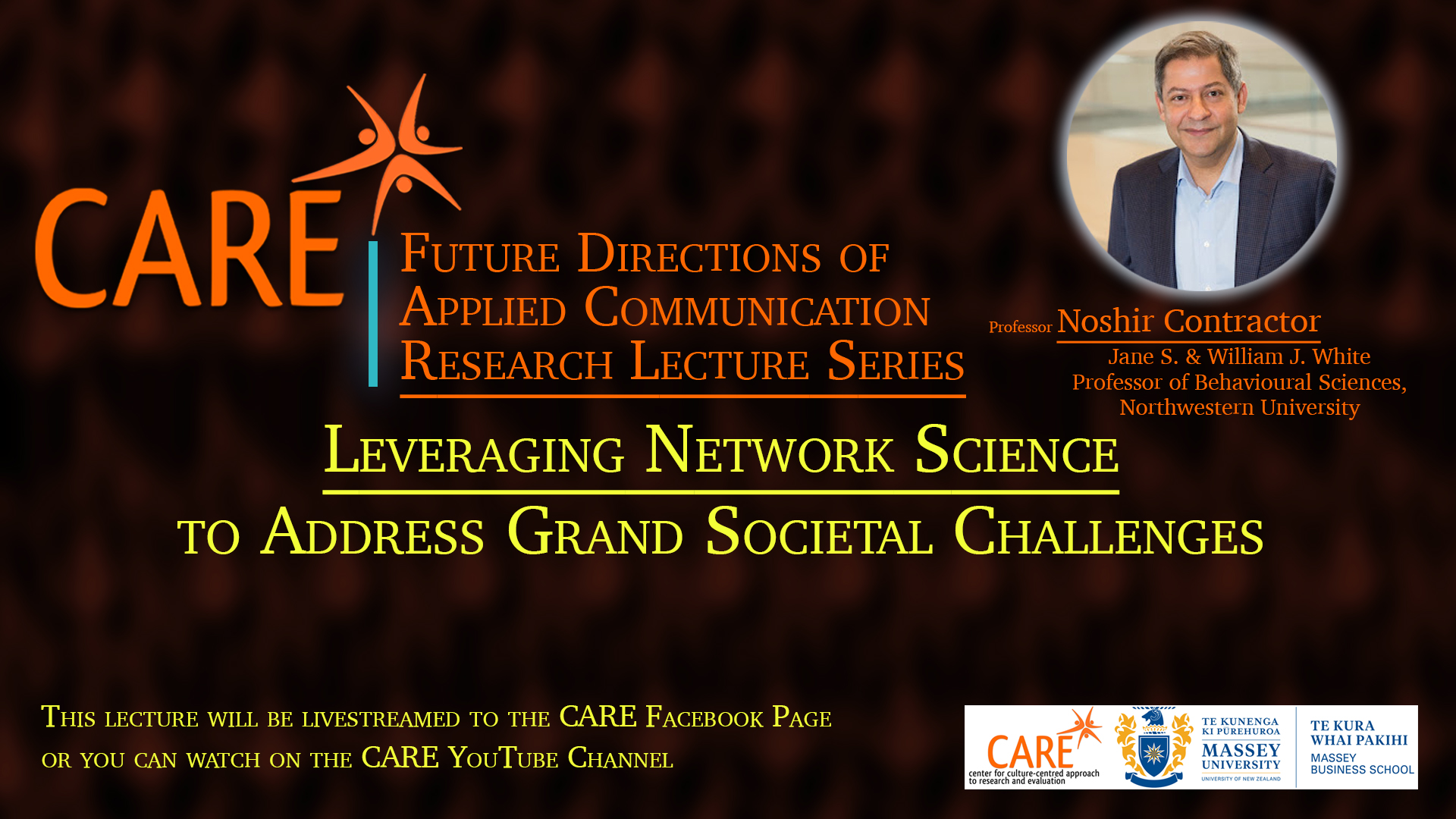
This second lecture in the Future Directions of Applied Communication Research Lecture Series is from Professor Noshir Contractor from Northwestern University. It centres around network science and how it can support applied communication scholarship.
Facebook: https://www.facebook.com/events/1548409152440542
YouTube: https://www.youtube.com/watch?v=vbyRrGhqcTc
Noshir Contractor is the Jane S. & William J. White Professor of Behavioral Sciences in the McCormick School of Engineering, the School of Communication and the Kellogg School of Management at Northwestern University. He investigates how social and knowledge networks form and perform. He is the former President of the International Communication Association. He is also a Distinguished Scholar of the National Communication Association and a Fellow of the Academy of Management, the American Association for the Advancement of Science, the Association for Computing Machinery, the Network Science Society, and the International Communication Association. He received the Lifetime Service Award from the Communication, Digital Technology, & Organization Division of the Academy of Management. Additionally, he received the Simmel Award from the International Network for Social Network Analysis (INSNA). He received the Distinguished Alumnus Award from the Indian Institute of Technology, Madras where he received a Bachelor’s degree in Electrical Engineering. He has a Ph.D. from the Annenberg School of Communication at the University of Southern California.
#NetworkSCience #SocietalChallenges #NoshirContractor #NorthwesternUniversity #AppliedCommunicationResearch #CARELectureSeries #CARECCA #CAREMassey #MasseyUni #Aotearoa #NewZealand
Future Directions of Applied Communication Research Lecture Series | Strategies for Conducting Applied Communication Research that Can Make a Difference
Lecture Topic: Strategies for Conducting Applied Communication Research that Can Make a Difference with Distinguished Professor Gary Kreps, George Mason University
Tuesday, 3rd September 2024 @ 10 am NZST on Facebook LIVE & YouTube LIVE!
Facebook: https://www.facebook.com/share/RMBrKaZwjuCLG5XZ/
YouTube: https://www.youtube.com/live/H-KCN0hnwuU
About the Lecturer: Prof. Gary Kreps is completing his 20th year on the faculty at George Mason University, where he currently serves as a Distinguished University Professor of Communication and Founding Director of the Center for Health and Risk Communication. Prof. Gary teaches courses concerning Communication Research, Health Communication, Risk Communication, Interpersonal Communication, Organizational Communication, Consumer-Provider Health Communication, Health Communication Campaigns, and Digital Communication.
Prior to joining the faculty at Mason, he had the pleasure of serving as the Founding Chief of the Health Communication and Informatics Research Branch at the National Cancer Institute (NIH), where he planned, developed, and coordinated major new national research and outreach initiatives concerning risk communication, health promotion, behavior change, technology development, and information dissemination to promote effective cancer prevention, screening, control, care, and survivorship.
Prof. Gary also served as the Founding Dean of the School of Communication at Hofstra University, Executive Director of the Greenspun School of Communication at UNLV, and in faculty and administrative roles at Northern Illinois, Rutgers, Indiana, and Purdue Universities.
Read more here
Read more about the CARE Lecture Series:
#AppliedCommunicationResearch #CARELectureSeries #CommunicationResearch #GaryKreps #CAREMassey #MasseyUni #GeorgeMasonUniversity #CARECCA #Aotearoa #NewZealand

